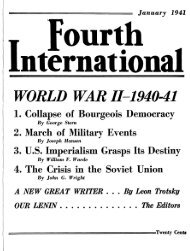National Liberation Movements and the Question of Socialism ...
National Liberation Movements and the Question of Socialism ...
National Liberation Movements and the Question of Socialism ...
Create successful ePaper yourself
Turn your PDF publications into a flip-book with our unique Google optimized e-Paper software.
world is, once again, placed at <strong>the</strong> forefront <strong>of</strong><br />
<strong>the</strong> communist movement.<br />
Definition<br />
A national liberation movement is, by definition,<br />
a political process, involving whatever means are<br />
dictated by <strong>the</strong> prevailing situation, to take <strong>the</strong><br />
economic, political, <strong>and</strong> social control <strong>of</strong> a country<br />
out <strong>of</strong> <strong>the</strong> h<strong>and</strong>s <strong>of</strong> a foreign power <strong>and</strong> place it under<br />
<strong>the</strong> rule <strong>of</strong> some <strong>of</strong> <strong>the</strong> population within that country.<br />
By definition:-a national liberation movement does<br />
not identify <strong>the</strong> class interests <strong>of</strong> <strong>the</strong> contending<br />
forces: It appears, superficially, as a nation-nation<br />
contest in which whole populations <strong>of</strong> <strong>the</strong>se nations<br />
are in opposition to each o<strong>the</strong>r. But, in <strong>the</strong> modern<br />
world, this cannot be <strong>the</strong> case: Nations that have<br />
been brought under <strong>the</strong> control <strong>of</strong> ano<strong>the</strong>r contain<br />
classes just as <strong>the</strong> dominant nations do. And it is<br />
this class content that requires examination.<br />
Modern national liberation movements are a<br />
response to imperialism, <strong>the</strong> monopoly capital stage<br />
<strong>of</strong> capitalist society. Under conditions imposed by<br />
this form <strong>of</strong> organization, businessmen maximize<br />
pr<strong>of</strong>its through various collusive forms <strong>of</strong> control.<br />
With <strong>the</strong> monopolization <strong>of</strong> <strong>the</strong> means <strong>of</strong> production,<br />
capitalists are able to extract greater-than-normal<br />
pr<strong>of</strong>its through <strong>the</strong> control <strong>of</strong> prices that can be<br />
raised above <strong>the</strong> competitive level through <strong>the</strong> restriction<br />
<strong>of</strong> output. That is, monopoly capitalists are in<br />
a position to 11 Charge what <strong>the</strong> market will bear 11<br />
because <strong>the</strong>y can reach agreements as to <strong>the</strong> most<br />
pr<strong>of</strong>itable level <strong>of</strong> output to produce. As <strong>the</strong>ir control<br />
over prices <strong>and</strong>, thus, pr<strong>of</strong>its, is determined<br />
by <strong>the</strong>ir control over production, it is absolutely<br />
imperative that capitalists lay hold <strong>of</strong> <strong>the</strong> strategic<br />
variables <strong>of</strong> <strong>the</strong> production process, from <strong>the</strong> starting<br />
point (<strong>the</strong> ga<strong>the</strong>ring <strong>of</strong> raw materials) to <strong>the</strong> end<br />
point (<strong>the</strong> distribution channels through which <strong>the</strong><br />
finished product is sold). To this end, <strong>the</strong> modern<br />
colonial system was developed in <strong>the</strong> second half <strong>of</strong><br />
<strong>the</strong> nineteenth century in order (principally) to<br />
control .sou:ces <strong>of</strong> raw materials, thus allowing <strong>the</strong><br />
monopol1zat1on <strong>of</strong> output. Obviously, one result <strong>of</strong><br />
this control was growing poverty among <strong>the</strong> majority<br />
<strong>of</strong> <strong>the</strong> colonial population. As <strong>the</strong> colony lost control<br />
over its own resources, it also lost control<br />
over its economic environment. Economic stagnation<br />
<strong>and</strong> increasing immiseration <strong>of</strong> <strong>the</strong> bulk <strong>of</strong> <strong>the</strong> population<br />
resulted.<br />
Modern colonization must be distinguished from<br />
colonization under conditions <strong>of</strong> competitive capitalism<br />
(roughly 1600 to <strong>the</strong> mid-1800's). In <strong>the</strong><br />
latter case, <strong>the</strong> principal function <strong>of</strong> <strong>the</strong> colonial<br />
system was to provide outlets for manufactured<br />
products. As competitive capitalists maximized<br />
pr<strong>of</strong>its by maximizing output (as opposed to monopolistic<br />
restriction <strong>of</strong> output), <strong>the</strong>y required an<br />
enormous extension <strong>of</strong> <strong>the</strong> market. Thus, <strong>the</strong> capitalists'<br />
governments secured markets abroad by<br />
imposing control through whatever means necessary<br />
(military invasion, etc.), destroying, for <strong>the</strong> most<br />
part, <strong>the</strong> portion <strong>of</strong> <strong>the</strong> indigenous economy that<br />
threatened to compete with <strong>the</strong>. colonial power's<br />
production (for example, <strong>the</strong> English destruction<br />
<strong>of</strong> <strong>the</strong> Indian textile industry), <strong>and</strong> established<br />
a kept foreign market for <strong>the</strong> home country's output.<br />
. In any case, regardless <strong>of</strong> whe<strong>the</strong>r <strong>the</strong> colony<br />
is 1mposed as a result <strong>of</strong> competitive or oligopolistic<br />
pressures, necessary relationships develop that are<br />
<strong>of</strong> a class nature. To impose <strong>the</strong>ir control over <strong>the</strong><br />
population <strong>of</strong> a colony, capitalists require <strong>the</strong> assistance<br />
<strong>of</strong> a portion <strong>of</strong> that population to act as <strong>the</strong>ir<br />
surrogates or allies. Generally, <strong>the</strong>y find this<br />
segment within <strong>the</strong> class <strong>of</strong> feudal lords who, as a<br />
result <strong>of</strong> economic development, find <strong>the</strong>mselves in<br />
a tenuous position. Because <strong>the</strong>y are increasingly<br />
decadent <strong>and</strong> reactionary, <strong>the</strong>y are increasingly<br />
challenged by o<strong>the</strong>r classes within <strong>the</strong>se countries<br />
(primarily <strong>the</strong> native capitalists) <strong>and</strong>, without outside<br />
assistance, would not be able to hold on to power.<br />
!hus, <strong>the</strong>y willingly assist <strong>the</strong> foreign capitalists<br />
1n subjecting <strong>the</strong> rest <strong>of</strong> <strong>the</strong> population to foreign<br />
4<br />
5
















